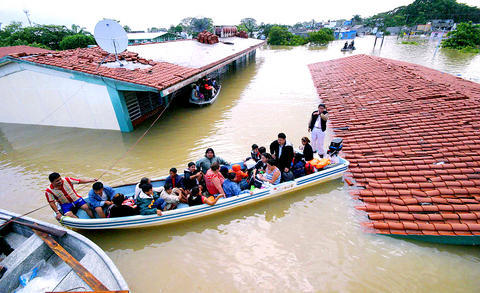One person was killed and more than 1 million people affected by flooding in Mexico's southern state of Tabasco, officials said, as hundreds of thousands waited yesterday for rescuers to pull them out of their homes in the worst floods ever in the region.
The oil-rich state the size of Belgium is now 80 percent underwater, officials said, adding that they expect the rain to continue.
Area rivers continue to swell because of the non-stop rain, and more than 850 towns have been flooded in the state, officials said.

PHOTO: AFP
"Of the 2.1 million Tabasquenos, more than half are suffering from this serious problem that has not been experienced in the history of Tabasco," state Governor Andres Granier told reporters.
"New Orleans was small compared to this," Granier said, comparing the flooding to that caused by Hurricane Katrina in 2005.
There is one major difference with Katrina: As of late Thursday, only one person was reported killed by the flooding. That person died on Wednesday.
"Around 300,000 people are still trapped in their homes," he said, adding that army and navy helicopters and rescue boats were working on the rescue effort.
"The situation is extraordinarily grave," Mexican President Felipe Calderon said in an address to the nation late on Thursday asking for donations.
He described the situation as "one of the worst natural disasters in the history of the country."
Tabasco "is devastated," Granier said. "One-hundred percent of crops are lost."
Granier warned that the flooding could get even worse as forecasters said a new cold front could bring more rain over the weekend.
Some 400 doctors and health workers were deployed to detect any outbreak of infections, the state's civil protection agency said.
Soldiers and state authorities had placed more than 700,000 sand bags along the rivers to prevent flooding, but the water rose above the barriers.
Authorities also drained water from two dams to prevent them from exceeding capacity. The drainage caused three rivers to burst their banks.

In his National Day Rally speech on Sunday, Singaporean Prime Minister Lawrence Wong (黃循財) quoted the Taiwanese song One Small Umbrella (一支小雨傘) to describe his nation’s situation. Wong’s use of such a song shows Singapore’s familiarity with Taiwan’s culture and is a perfect reflection of exchanges between the two nations, Representative to Singapore Tung Chen-yuan (童振源) said yesterday in a post on Facebook. Wong quoted the song, saying: “As the rain gets heavier, I will take care of you, and you,” in Mandarin, using it as a metaphor for Singaporeans coming together to face challenges. Other Singaporean politicians have also used Taiwanese songs

NORTHERN STRIKE: Taiwanese military personnel have been training ‘in strategic and tactical battle operations’ in Michigan, a former US diplomat said More than 500 Taiwanese troops participated in this year’s Northern Strike military exercise held at Lake Michigan by the US, a Pentagon-run news outlet reported yesterday. The Michigan National Guard-sponsored drill involved 7,500 military personnel from 36 nations and territories around the world, the Stars and Stripes said. This year’s edition of Northern Strike, which concluded on Sunday, simulated a war in the Indo-Pacific region in a departure from its traditional European focus, it said. The change indicated a greater shift in the US armed forces’ attention to a potential conflict in Asia, it added. Citing a briefing by a Michigan National Guard senior

CHIPMAKING INVESTMENT: J.W. Kuo told legislators that Department of Investment Review approval would be needed were Washington to seek a TSMC board seat Minister of Economic Affairs J.W. Kuo (郭智輝) yesterday said he received information about a possible US government investment in Taiwan Semiconductor Manufacturing Co (TSMC, 台積電) and an assessment of the possible effect on the firm requires further discussion. If the US were to invest in TSMC, the plan would need to be reviewed by the Department of Investment Review, Kuo told reporters ahead of a hearing of the legislature’s Economics Committee. Kuo’s remarks came after US Secretary of Commerce Howard Lutnick on Tuesday said that the US government is looking into the federal government taking equity stakes in computer chip manufacturers that

US President Donald Trump on Friday said that Chinese President Xi Jinping (習近平) told him China would not invade Taiwan while Trump is in office. Trump made the remarks in an interview with Fox News, ahead of talks with Russian President Vladimir Putin over Moscow’s invasion of Ukraine. “I will tell you, you know, you have a very similar thing with President Xi of China and Taiwan, but I don’t believe there’s any way it’s going to happen as long as I’m here. We’ll see,” Trump said during an interview on Fox News’ Special Report. “He told me: ‘I will never do